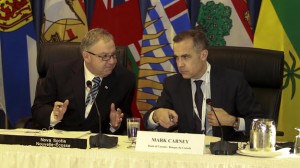
Nova Scotia Premier Darrell Dexter and Bank of Canada Governor Mark Carney at the two day economic forum (Province of Nova Scotia)
“We want to become masters of our own destiny when it comes to the immigration file. Nobody better understands our needs and our capacity to accommodate and our capacity to develop new Canadians so they can develop to their fullest,” said Ontario Premier Dalton McGuinty at today’s news conference.
British Columbia Premier Christy Clark added: “We want more space to be able to make our decisions about which immigrants will come to our provinces, where they will be settled and how many we’ll get.”
Quebec has had an independent immigration program since the 1970s, but the other provinces only started being delegated immigration selection powers over the last decade with the signing of several federal-provincial agreements creating Provincial Nominee Programs (PNPs).
While the number of provincial nominees has grown seven fold since 2004, with 42,000 to 45,000 individuals expected to immigrate under a PNP in 2012, the pace of change is not fast enough for the provinces, who want to select a greater share of the approximately 250,000 individuals who are admitted into Canada as permanent residents each year.
The provincial premiers say that being able to select their own immigrants gives them more power to control the direction of their economic development by selecting those individuals that have the skills to meet their regional labour shortages, which they say their governments are best positioned to assess.
The two-day economic forum was hosted by the Council of the Federation, an institution created by the provincial and territorial governments to facilitate collaboration between their respective governments.
The forum saw presentations from Bank of Canada Governor Mark Carney and Professor of Economics at George Mason University, Tyler Cowen, author of The Great Stagnation.
